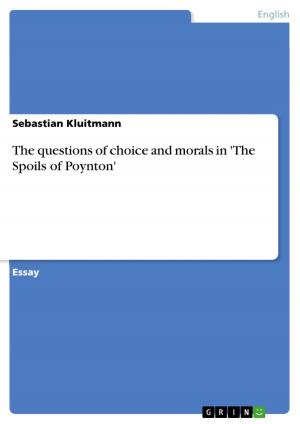Man Doll and Woman Doll Strike Back - The De-construction of 1960s American Consumer Culture in Jean-Claude von Itallie´s 'Motel'
The De-construction of 1960s American Consumer Culture in Jean-Claude von Itallie´s 'Motel'
Nonfiction, Entertainment, Drama, Anthologies| Author: | Peter Brüstle | ISBN: | 9783638808972 |
| Publisher: | GRIN Publishing | Publication: | March 19, 2007 |
| Imprint: | GRIN Publishing | Language: | English |
| Author: | Peter Brüstle |
| ISBN: | 9783638808972 |
| Publisher: | GRIN Publishing |
| Publication: | March 19, 2007 |
| Imprint: | GRIN Publishing |
| Language: | English |
Seminar paper from the year 2005 in the subject American Studies - Culture and Applied Geography, grade: 1,3, University of Freiburg (Institut für Nordamerikastudien), course: Modern and Postmodern American Drama, 25 entries in the bibliography, language: English, abstract: It was then that began our extensive travels all over the states. To any other type of tourist accommodation I soon grew to prefer the Functional Motel - clean, neat, safe nooks, ideal places for sleep, argument, reconciliation, insatiable, illicit love. (Vladimir Nabokov, Lolita) In her very recent dissertation Kerstin Schmidt describes van Itallie's plays as being among the 'most innovative theatrical forms to have been developed in the second half of the 20th century' (87). Motel, one of his most aggressive plays, has not lost its signi?cance more than 40 years after its ?rst performance. As in the 1960s, its mixture of violence, political satire and theatrical innovation is still of relevance to present-day audiences. A similar combination of postmodern violence, commodity-fetishism and crisis of identity has for example been adopted by the British 'inyerface-theatre' of the 1990s 1 . As far as literary criticism is concerned, there have been publications by three signi?cant authors on Jean-Claude van Itallie's Motel. The most profound are Gene A. Plunka's writings in which he works out the in?uence of Jean Artaud's The Theater and its Double on van Itallie's plays and especially on Motel. Another informative contribution have been Herbert Grabes' two essays on the possibilities of social critique and on myth and myth destruction in Motel. Only lately, Kerstin Schmidt, in her dissertation has contributed to a new critical discussion of the America Hurrah-trilogy in the context of postmodern theory. All three authors interpret the two dolls' destructive behavior as impersonations of America's latent aggression and as advent of a 'posthumanist culture' (Schmidt, 125) the 1960s. While Plunka praises Motel for its sharp-wittedness, Grabes questions the ability of the play, to criticize existing social conditions. Especially does he condemn the play for its 'Spenglerian Determinism'. Kerstin Schmidt's approach on the other hand opens new aspects on 'Motel' with her focus on the representation of the postmodern sense of identity in the play. Altogether however, the authors agree that 'Man doll' and 'Woman doll' symbolize the self-destructive forces within American society. Hence, they see the two dolls not so much as active agents but as passive victims of postmodern American society. From this perspective, the play must be read as a dark satire on American society, which hardly leaves any hope for social change. [...]
Seminar paper from the year 2005 in the subject American Studies - Culture and Applied Geography, grade: 1,3, University of Freiburg (Institut für Nordamerikastudien), course: Modern and Postmodern American Drama, 25 entries in the bibliography, language: English, abstract: It was then that began our extensive travels all over the states. To any other type of tourist accommodation I soon grew to prefer the Functional Motel - clean, neat, safe nooks, ideal places for sleep, argument, reconciliation, insatiable, illicit love. (Vladimir Nabokov, Lolita) In her very recent dissertation Kerstin Schmidt describes van Itallie's plays as being among the 'most innovative theatrical forms to have been developed in the second half of the 20th century' (87). Motel, one of his most aggressive plays, has not lost its signi?cance more than 40 years after its ?rst performance. As in the 1960s, its mixture of violence, political satire and theatrical innovation is still of relevance to present-day audiences. A similar combination of postmodern violence, commodity-fetishism and crisis of identity has for example been adopted by the British 'inyerface-theatre' of the 1990s 1 . As far as literary criticism is concerned, there have been publications by three signi?cant authors on Jean-Claude van Itallie's Motel. The most profound are Gene A. Plunka's writings in which he works out the in?uence of Jean Artaud's The Theater and its Double on van Itallie's plays and especially on Motel. Another informative contribution have been Herbert Grabes' two essays on the possibilities of social critique and on myth and myth destruction in Motel. Only lately, Kerstin Schmidt, in her dissertation has contributed to a new critical discussion of the America Hurrah-trilogy in the context of postmodern theory. All three authors interpret the two dolls' destructive behavior as impersonations of America's latent aggression and as advent of a 'posthumanist culture' (Schmidt, 125) the 1960s. While Plunka praises Motel for its sharp-wittedness, Grabes questions the ability of the play, to criticize existing social conditions. Especially does he condemn the play for its 'Spenglerian Determinism'. Kerstin Schmidt's approach on the other hand opens new aspects on 'Motel' with her focus on the representation of the postmodern sense of identity in the play. Altogether however, the authors agree that 'Man doll' and 'Woman doll' symbolize the self-destructive forces within American society. Hence, they see the two dolls not so much as active agents but as passive victims of postmodern American society. From this perspective, the play must be read as a dark satire on American society, which hardly leaves any hope for social change. [...]















